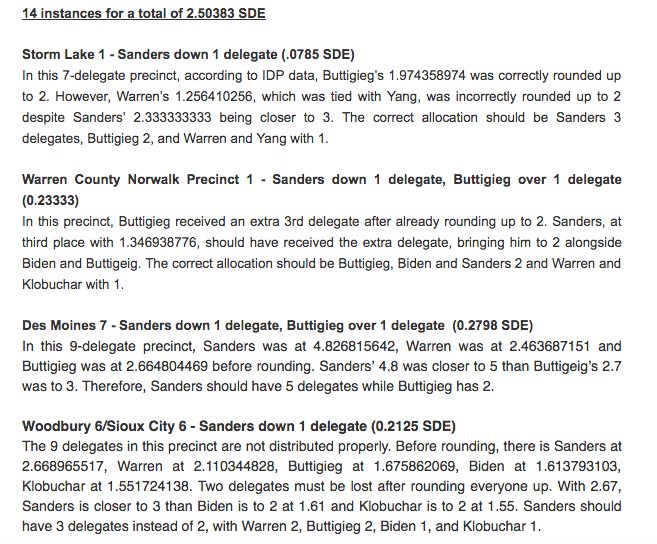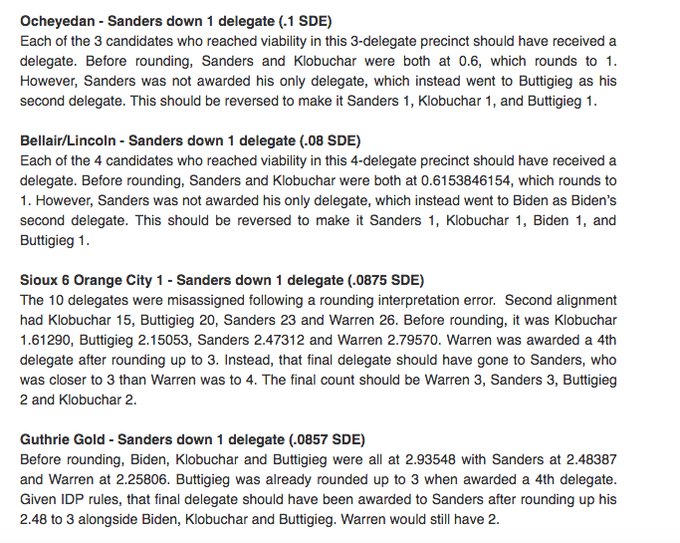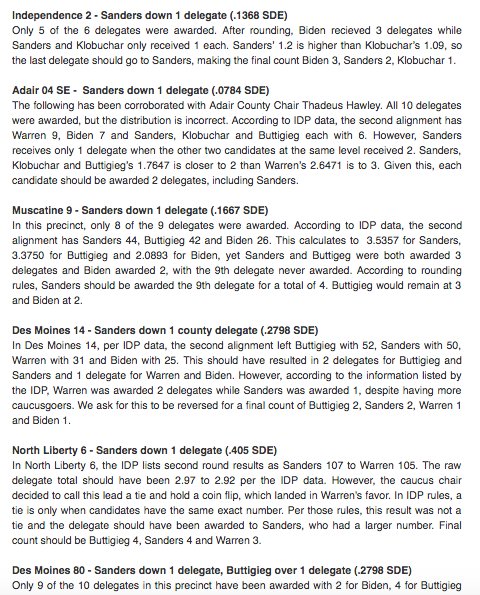
The Iowa Caucus results continue to be controversial and confusing. With 100 percent of the precincts reporting, Pete Buttigieg and Bernie Sanders are essentially tied in estimated national delegates. Sanders leads in votes and Buttigieg has a slight lead in SDE (State Delegate Equivalents.) Because of math inconsistencies and other issues, neither AP nor Decision Desk has called a winner. Some are saying the discrepancies that the Iowa Democratic Party (IDP) has not addressed might change the SDE totals. Here’s a closer look at the results and what’s happened so far.
Sanders & Buttigieg May Walk Away with the Same Number of National Delegates
At almost 100% reporting, Buttigieg is shown with a slight lead in the State Delegate Equivalents (SDE) while Sanders is leading in the total vote. But the SDE number is disputed. First, here’s the SDE count from Decision Desk.
Democratic Delegate Equivalents
And here is the final vote count, as reported by Decision Desk.
Democratic Votes: 2nd Round
It’s currently estimated that despite these differences, Sanders and Buttigieg may have roughly the same number of national delegates from Iowa.
Sanders’ campaign released a statement about the situation.
In its statement, Sanders’ campaign listed discrepancies in the results that could add up to a total of 2.50383 SDE, which might be enough to tip the scales to Sanders’ side if verified.
At this point, it looks like Sanders and Buttigieg will likely be given the same national delegate count. Here’s a look at some of the math errors and inconsistencies still being questioned.
Inconsistencies & Math Errors Plagued the Results
Inconsistencies, math errors, and rounding issues have plagued the results, and many are saying that some of those errors still exist even with 100% reporting.
Nate Cohn of the New York Times said many errors still had not been addressed. He wrote in a series of tweets: “With 100% counted, it’s Buttigieg by a mere 1.5 SDE according to the IDP. It includes the satellite rule in favor of Sanders, worth >3 dels, but also dozens of irregular, inconsistent or impossible precincts in need of verification before a projection we might never get… On quick examination, all of my ‘favorite’–forgive me–possible/likely errors are still there… As an aside, we’ve given them a full list of the precincts involved here and they’re still putting it out… I suspect I can say this without crossing the line into opinion: this is the worst conceived and executed electoral contest I have ever seen.”
On Twitter, @Taniel (Daniel Nichanian of The Appeal), pointed out that UAW Local 94 wasn’t on the IDP’s list that said 100% of precincts had reported in.
He added: “I’m floored that (with 0.1% difference) IDP did not address glaring errors many on here (incl. myself) verified & threaded for them for 24+ hours. NYT wrote a whole piece!! We did the work. It takes mns for them to re-verify. I hope these results are not reported at face-value.”
Tom Perez, the DNC chair, has called for the Iowa Democratic Party to recanvass the results in light of the errors. But the Iowa Democratic Party (IDP) has said a candidate must request a recanvass or a recount for it to happen.
CNN is reporting that Perez called for this recanvass because of how SDEs were being allocated at satellite sites, according to unnamed sources. Precinct sources have said online and to Heavy that some satellite locations were favoring Bernie Sanders.
Bernie Sanders pointed out in a press conference that the SDE number is not as important as it was in 2016 due to changes in the DNC rules. He said, in part: “These State delegate equivalents have greatly diminished importance… As it stands right now to the best of my knowledge, either me or Mr. Buttigieg will end with a tiny fraction of advantage in the SDEs… Given the main precincts’ outstanding and mathematical errors, we could well end up with more SDEs. But this difference…is meaningless because we are both likely to receive the same number of national delegates… Those actual delegates, not the state delegates, are the ones we need now in the nominating process.”
The IDP has been receiving notifications on Twitter about mathematical errors and other inconsistencies for days. Some have been fixed and some have not. You can read about some of them in Heavy’s story here.
There were also coin toss moments that were questioned, like this one shared by a BBC reporter on Twitter. Anthony Zurcher noted that the man who flipped the coin was a Florida student who was picked as an “impartial observer.” He said he was nervous and caught the coin between his fingers.
At least some errors were fixed, as noted in the tweet below.
But many still remain, according to reports from concerned voters, the New York Times, and Sanders’ campaign, among others.
Many Outlets Aren’t Declaring a Winner, But CNN’s Coverage of Buttigieg at His Town Hall Is Generating Controversy
Many outlets are refusing to report a winner based on all the confusion we’ve seen so far. NBC, for example, has said that Decision Desk is not declaring a winner.
AP has also said it’s unable to declare a winner.
Meanwhile, many viewers have said that CNN told Pete Buttigieg that he had won right when he stepped on stage for his town hall on Thursday night. Some viewers are crying foul about that. Heavy has not been able to verify the exact wording of what Buttigieg was told, but we will include the video here once it’s available. Meanwhile, some Pete supporters on Twitter have taken the news as meaning Pete won:
And others interpreted CNN as saying Buttigieg had won too.
CNN has said officially on Twitter that Buttigieg has a “narrow lead” and that Democratic candidates have until 12 p.m. Central on Friday to file a recount or recanvass request. If they don’t, CNN will declare a winner then.
But many viewers thought CNN had said Buttigieg had won during his town hall.
@Taniel, who has been reporting on the errors and inconsistencies on Twitter, wrote:
Sanders has said that they are not going to request a recanvass and are ready to move on from Iowa.
The New Hampshire primary is on February 11.





